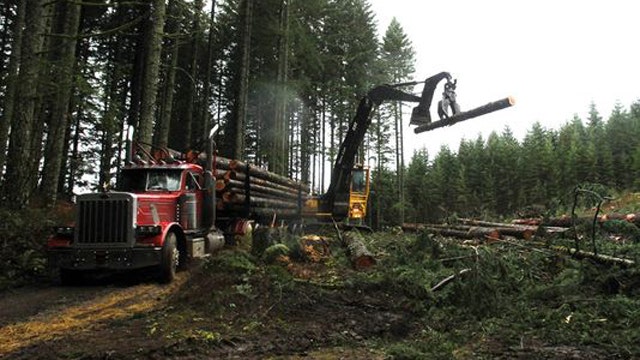The Rough and Ready Sawmill was an institution in southern Oregon for 91 years. Its lumber helped fuel the post-World War II building boom and settle the rural West. Now, it sits empty, the last of 22 mills in Josephine County to shut down for good, signaling the end of an era.
For Ivan Cross, it's the end of the only job he's ever had.
"I haven't drawn an unemployment check in 43-and-a-half years," said Cross. "Now, that's what I do for a living."
While Rough and Ready sits in the middle of America's richest timber country, the federal government owns 80 percent of the land. Many in these decimated small towns blame The Endangered Species Act, which paved the way for a flood of lawsuits blocking federal timber sales, because of an endangered species in the region.
"You just can't run a business, no matter how you adapt, if you don't have the raw materials and the log supply to run that business," said Link Phillippi, owner of Rough and Ready.
In the last two decades since the spotted owl was listed as an endangered species, more than 200 sawmills have closed in the Pacific Northwest directly killing 40,000 good-paying jobs. It has turned Josephine County, once Oregon's fastest growing, into its poorest with 30 percent of the residents using food stamps. One out of every five adults in Cave Junction, the closest city to Rough and Ready, is unemployed. When voters shot down a tax increase last year, the sheriff released most inmates and cut two-thirds of his department.
"You've lost the jobs that used to be here," said Oregon Republican Rep. Greg Walden. "You've lost the economy that used to be there, therefore you've lost the revenues for the basic services. It's becoming a lawless county."
Walden and House Republicans have offered a solution: H.R. 1526, Restoring Healthy Forests for Healthy Communities Act. It would take 1.8 million acres of federal land in Oregon currently being managed by the Bureau of Land Management and put it into a trust to be managed under Oregon's environmental laws for timber harvest.
While the bill has bipartisan support, notably from Oregon's Democrat-controlled state legislature and Democratic Oregon Rep. Peter DeFazio, environmental groups have lined up against it.
"This would be a giveaway of public lands that would be managed exclusively for timber with all the damage that would come from clear-cutting on steep slopes, the loss of salmon and the loss of public values," said Dominic DellaSala of the non-profit Geos Institute.
DellaSala acknowledges the bill would provide a short-term economic benefit for Oregon's rural timber counties, but he says eventually the large trees would run out and the sawmill jobs will leave again. Left behind, he argues, would be a permanently damaged ecosystem.
H.R. 1526 passed in the House last week with support from 22 Democrats and all but one Republican. The final vote was 249-166.
But if the bill were to pass in the Senate, it could face a presidential veto. Senior advisers signaled they would recommend President Obama veto it. The Statement of Administration Policy, issued last week, says the bill would "accelerate commercial timber harvests without appropriate environmental review and public involvement."
In other words, it would be far tougher for environmental groups to sue to block future timber sales on those 1.8 million acres.
Ivan Cross feels like he and the other now-unemployed mill workers are being left out of the equation.
"I'm starting to feel like the endangered species," Cross said.





